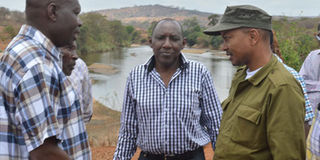Stand-off over Sh11bn Thwake dam business

Former Irrigation Principal Secretary Patrick Nduati (right) confers with government officials about the proposed Thwake dam project at the site on October 17, 2016. PHOTO | NATION MEDIA GROUP
What you need to know:
- Small-scale merchants who hoped to be sub-contracted to supply raw materials and do less technical engineering works will have to compete for such tenders with other established firms.
- Governor Ngilu said unless the government intervened to protect small-scale merchants, Ukambani residents would feel short-changed.
Mr Chelugui assured the governors that the ministry had taken their concerns seriously and would ensure traders from the region are given first priority.
A fresh standoff has emerged between the contractor building the Thwake dam and Ukambani governors over the sharing of Sh11 billion worth of business opportunities arising from the project.
The contract awarded to China Ghezouba Group stipulates that 30 per cent of works and supplies in the Sh36.9 billion dam — which is the first phase of the Sh63 billion multipurpose project — should be sub-contracted to local firms.
LOCAL TRADERS
However, China Ghezouba Group has defined local firms to mean Kenyan companies, including those from within the project area.
The construction works, which started in November last year, require huge quantities of cement, sand, ballast, steel and other supplies which the contract only stipulates should not be imported but sourced locally.
The sharing formula of the Sh11 billion windfall dominated discussions when Water and Sanitation Cabinet Secretary Simon Chelugui toured the dam site to inspect ongoing work last week, with governors demanding their people must get a substantial share.
The CS confirmed that the contractor had been advanced a down payment of Sh7 billion to mobilise equipment and begin the actual construction. The project is expected to be completed in 56 months (four and half years).
According to project engineer Musembi Munyao, out of the Sh11 billion set aside for Kenyan companies, only a paltry 10 per cent (Sh1.1 billion) worth of sub-contracts will benefit merchants from Kitui, Machakos and Makueni counties, with the rest going to firms which qualify under national competitive tendering.
“Local firms in the contract are defined as all Kenyan companies, whether they are within Ukambani region or not but we’ll redefine this to factor local merchants from Kitui, Machakos and Makueni,” he said.
SHORT-CHANGED
This means the small-scale merchants who hoped to be sub-contracted to supply raw materials and do less technical engineering works will have to compete for such tenders with other established firms across the country.
This revelation angered governors Charity Ngilu (Kitui), Dr Alfred Mutua (Machakos) and Prof Kivutha Kibwana (Makueni), who demanded that the formula be reviewed upwards, with at least Sh5.5 billion being reserved for small-scale businesses from the region. “It would be very wrong for residents to watch as traders from other regions are allowed to supply locally available materials or engaged in works that they also have capacity to do,” Prof Kibwana said. His concerns were echoed by Dr Mutua and Mrs Ngilu, who said residents had legitimate expectations that the project would benefit them.
Governor Ngilu, who mooted the project during her tenure as Water minister in President Mwai Kibaki’s administration, said unless the government intervened to protect small-scale merchants, Ukambani residents would feel short-changed.
Mr Chelugui assured the governors that the ministry had taken their concerns seriously and would ensure traders from the region are given first priority.
DEFERRED
“Under the contract for construction of dam embankment and associated works, 30 per cent of works worth about Sh11 billion will be sub-contracted to local companies but with preference to firms owned by groups or individuals residing within the dam area,” Mr Chelugui said.
The governors also want the four components of the Thwake dam project re-arranged to guarantee food security in the region
The dam, a Vision 2030 flagship project, will be implemented in four main phases: Construction of a 77-metre-high dam; a hydro-power generation component; 34,600 cubic metres of water supply; and irrigation of 40,000 hectares of land.
It is designed to supply piped water for domestic use, serve the Konza techno city and adjacent towns, irrigate farms downstream and generate 23 megawatts of hydro power.
However, local leaders want the power generation component deferred until the water supply and irrigation components are achieved. "Our stand as a community remains that food and water are more basic than electric power. So after the dam is constructed, let us first irrigate the 40,000 hectares downstream before generating power for the national grid," he said.





